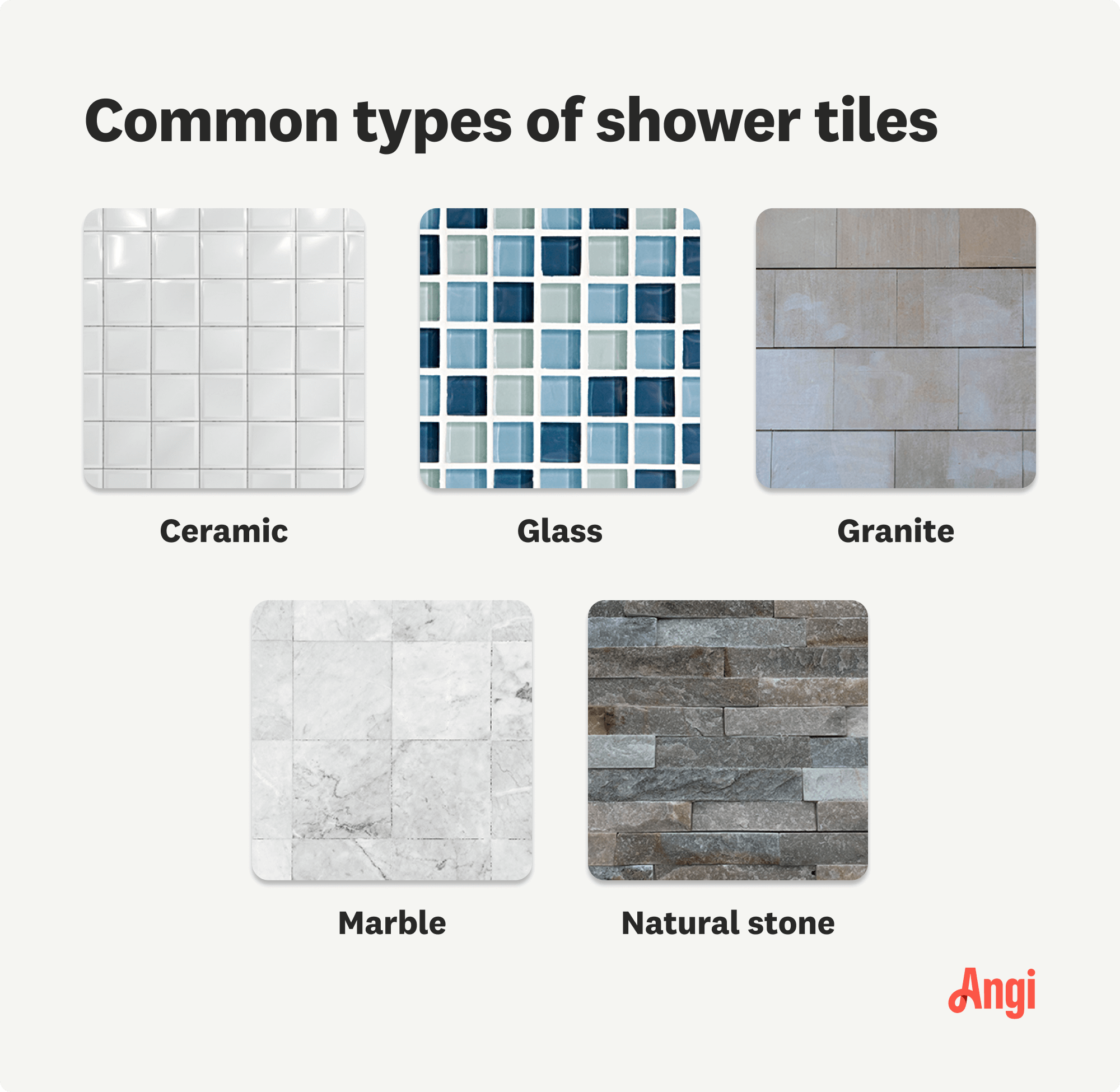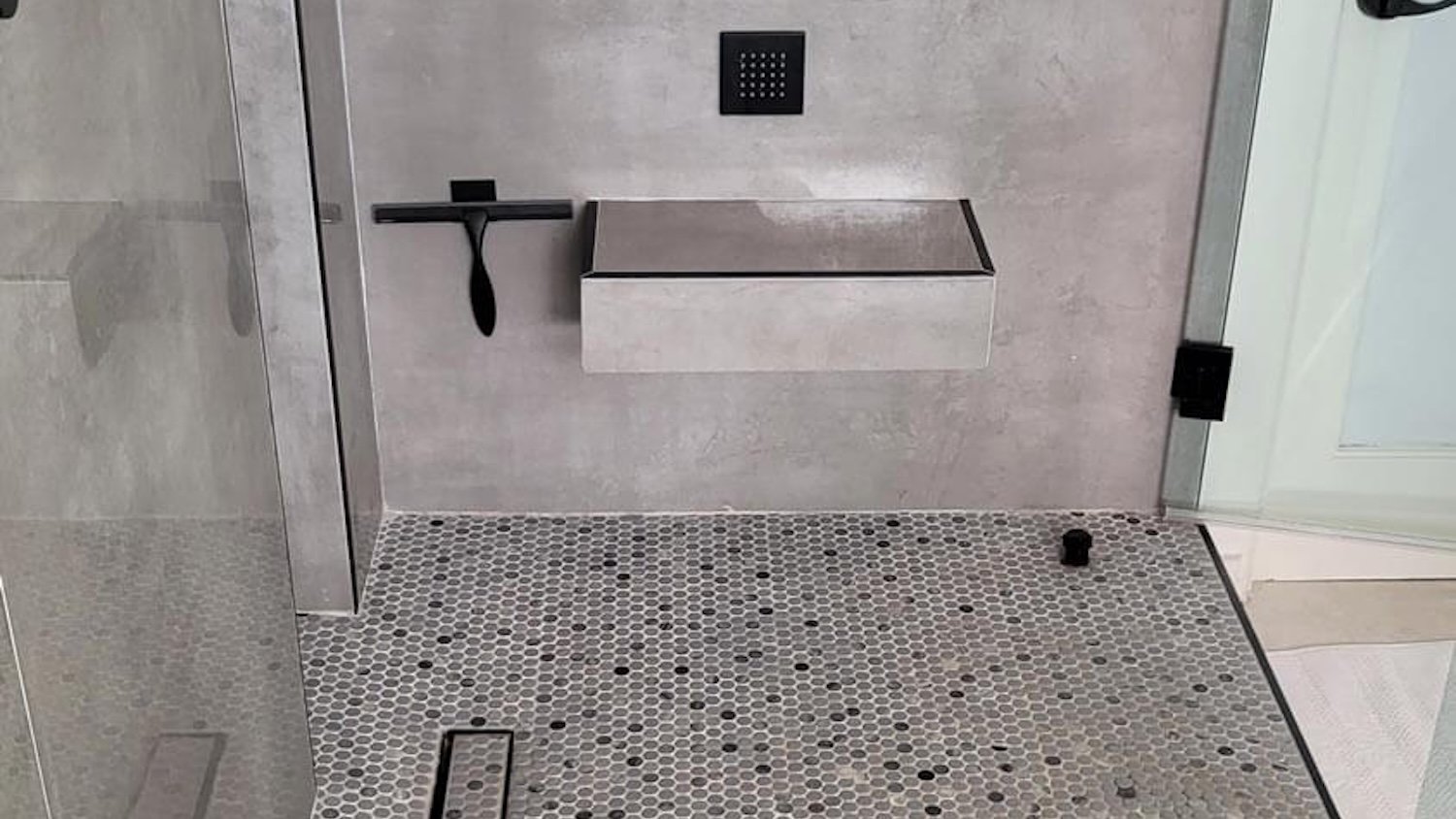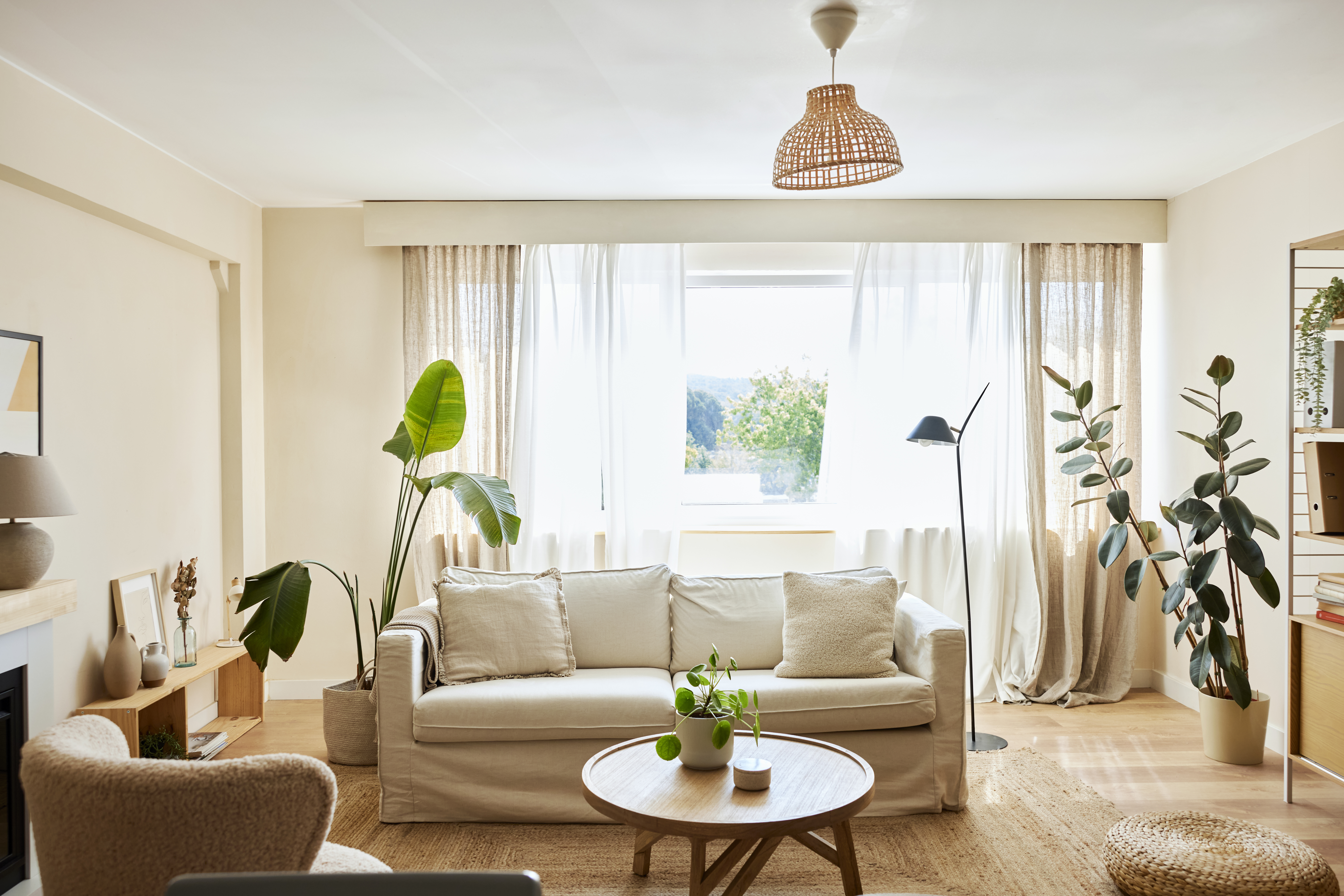How Much Does It Cost to Tile a Shower? [2025 Data]
The average cost to tile a shower is $2,700, but it ranges from $1,800 to $5,000. A larger shower or tiles will drive up the final price. A tile installer can quote the cost to update your shower tile.


The type of tile you choose can dramatically affect your material costs, with options like marble and natural stone costing three times as much as ceramic tiles.
Your total will be lower if you choose larger tiles, as they require much less labor to set in place and less time to grout between them once set.
Removing the old shower tile can reveal hidden water damage and mold that can add thousands to your remodel costs.
DIYing the work will cost less than half of hiring a pro, but it is challenging to get right and may end up costing you more to fix mistakes in the long run.
The average cost to tile a shower is around $2,700, which includes the tile, setting materials, and professional installation, but it can go up to $10,000 or more. If your shower is outdated, worse for wear, or just not meeting your desired aesthetic, a fresh tile job can change up its look. The type of tile you choose will impact your budget most, but other variables like size and labor costs also play a role. Here’s what it could cost to tile your shower.
Shower Tiling Prices by Type
Since the price of the shower tile you choose will play a big role in your overall costs, let’s break down the most common types of tile.

Ceramic
Most ceramic tiles cost between $10 and $25 per square foot installed. However, premium handmade varieties can go as high as $120 per square foot. Installing ceramic tile is a beautiful and durable choice for tiling a shower and comes in a huge array of styles and colors.
Slate
Slate tiles cost between $15 and $20 per square foot for installation. These stone tiles are well-suited for wet areas and have a natural rustic appeal. Extra finishes like a polished surface will increase the cost.
Porcelain
Porcelain tiles typically cost between $15 and $50 per square foot for installation. These sturdy tiles are an excellent investment when it comes to tiling a shower as they stand up well to stains, moisture, cracking, and scratches.
Marble
The cost to tile a shower with marble falls between $20 and $65 per square foot. This type of tile requires sealing during installation and regular resealing to avoid stains.
Limestone
Limestone shower tiles cost between $25 and $60 per square foot for professional installation. Thanks to its low-gloss look, this stone adds natural beauty and rustic appeal to showers. Like marble, it requires sealing at the time of installation and regular sealing.
Granite
Installing granite shower tiles typically costs $10 to $65 per square foot. These shower tiles aren’t a common choice, but they offer the look of polished stone without additional maintenance.
Terracotta
The cost to tile a shower in terracotta ranges between $10 and $30 per square foot on average. This clay tile comes in both glazed and unglazed varieties. Since clay is a porous material, it requires sealing after installation.
Glass
The most expensive of tile options, glass tiles cost between $35 and $60 per square foot to have installed, with premium varieties going for as much as $180 per square foot.
Glass tiles are translucent, which means they call for meticulous smoothing of the underlying adhesive; even the smallest flaws can show through. With that in mind, expect higher labor rates for glass tile installation in a shower, and always opt for a professional installation over DIY. Since glass isn’t porous, glass tiles are an excellent choice for shower tile in a small bathroom.
Pebble Tile
Pebble shower tiles usually go for around $40 to $70 per square foot installed. These sheets of tile consist of small rocks glued together. The textured surface makes a beautiful accent to other tiles or can cover the whole wall.
Quarry Pavers
Quarry pavers usually cost around $15 to $40 per square foot installed. These clay pavers come unglazed for a natural terracotta-like appearance or glazed in a variety of colors and patterns.
| Shower Tile | Average Cost (Per Square Foot) |
|---|---|
| Ceramic | $10–$25 |
| Slate | $15–$20 |
| Porcelain | $15–$50 |
| Marble | $20–$65 |
| Limestone | $25–$60 |
| Granite | $10–$65 |
| Terracotta | $10–$30 |
| Glass | $35–$60 |
| Pebble | $40–$70 |
| Quarry pavers | $15–$40 |
Shower Size
A larger shower means more materials and more labor. The larger the shower size, the higher the overall cost will be. However, most shower installers near you will offer price breaks for larger projects, so you may end up paying less per square foot. The sizes and average cost ranges below act as a helpful guide, but prices depend on the height of the walls and how far up your tiles go.
| Shower Size (Inches) | Cost Range |
|---|---|
| Small (32x32) | $400–$3,100 |
| ADA-compliant (36x36) | $430–$3,500 |
| Medium (60x36) | $520–$4,290 |
| Large (48x48) | $575–$4,680 |
Tile Size
Tiles come in a variety of sizes, from mosaic tiles that are less than 1/2-by-1/2 inches to large-format tiles that are 16-by-16 inches. Large-format tiles may result in higher labor costs since they require greater care during transportation and installation to prevent breakage.
Tile Patterns
Shower tile can have a uniform appearance, or varying colors and textures can form ornate, colorful patterns. If you want a custom design, this will call for extra labor. See the table below for a cost comparison of these popular patterns.
| Tile Patterns | Labor Cost (Per Square Foot) |
|---|---|
| Herringbone (diagonal) | $14.50–$16.50 |
| Nature stone design | $10 or more |
| Pinwheel | $20 |
| Staggered brick | $5–$10 |
| Subway tile | $7–$15 |
Tile Finish
The tile finish refers to its surface appearance, and your choice may depend on current bathroom tile trends. A glossy, or shiny finish, is typically the most affordable finish and offers a bright look for the space. Matte and rustic finishes are flat and offer a softer look. They can also provide more grip than glossy tiles that tend to be slippery. These finishes usually cost more than glossy finishes, but may be the right choice depending on the aesthetic of the space. Metallic tiles can be shiny or matte and can enhance a space with an industrial look, but they are the most costly tile finish option.
| Tile Finish | Material Cost (Per Square Foot) | Installation Cost (Per Square Foot) |
|---|---|---|
| Glossy | $1.25–$50 | $4.25–$65 |
| Matte | $5–$50 | $10–$65 |
| Metallic | $20–$50 | $25–$65 |
| Rustic | $5–$100 | $15–$110 |
Labor and Installation
Expect to pay between $10 and $15 per square foot to cover labor costs for this project. Different types of tile require more skilled, detail-oriented installations, which will drive up the price. For example, stone and other porous tiles need sealing when installed, which means higher labor costs on your bill.
Additional Costs to Consider
Aside from basic labor and materials, a few extras can increase your budget. Here are the main additions that affect your cost to tile a shower.
Old Tile Removal
Removing old tiles before retiling your shower will cost an additional $1.50 to $4.50 per square foot. Whether you’re trying to save on your shower or the cost of tiling an entire bathroom, you can save by removing old tile yourself. However, it’s possible to damage your shower or flooring in this process, so you shouldn’t take it on unless you know what you’re doing.
Tub-to-Shower Conversion
The cost to convert a tub into a shower ranges from $1,500 to $1,800. The project cost varies based on size, materials, style, and custom additions, such as shelving and ornate tile designs.
Waterproofing
Tile shower waterproofing will add about $1 per square foot to your overall costs. A pro will install a waterproofing membrane before the shower tile to shield your tile backing board against moisture.
Heated Floor
Heated floors cost $1,700 to $6,700 or more and add an extra-luxurious feel to your bathroom. Radiant heating can extend to your shower floor as well, provided it’s completely waterproof. This feature requires professional installation to ensure safety.
Threshold
Adding a marble threshold to your shower costs an additional $30 to $75 on average. Pre-made thresholds come in a variety of colors, or you can use a matching slab from your countertops.
Wall Repairs
If the previous shower tile wasn’t properly waterproofed or the wall behind the tile is damaged, you may be looking at adding wall repairs to the total cost. Water damage repair costs between $3.75 and $10 per square foot on average, but the actual cost will depend on the extent of the damage. A licensed water damage professional can be called in to assess the area and make recommendations for repairs.
Mold Testing and Remediation
If you suspect or see mold, having the area tested is the best way to protect your home and your health. A mold inspection costs between $350 and $1,100 and involves a professional doing a visual inspection, swabbing areas that could contain mold, and assessing your HVAC system. If they determine that a mold test is necessary, that will cost between $250 and $500 depending on whether or not samples are sent to a lab or the inspector uses their own tools.
If mold is identified and needs to be removed, professional mold remediation costs between $1,100 and $3,300.
Cost to Tile a Shower Yourself

DIY shower tile installation costs an average of $800 to $1,400 in total, though this varies considerably based on the shower size, type of tile, and supplies you already have on hand. This can save you labor costs, but it’s a challenging project that requires precise measuring, cutting, and leveling. Plan to budget approximately three to four days of your time as well.
DIY Cost vs. Hiring a Pro to Retile Your Shower
You’ll save an average of $10 to $15 per square foot off the cost to retile your shower if you DIY this project. However, it calls for a lot of tiling tools and supplies, not to mention the extra investment of your time and energy. It’s also a fairly complex process that leaves room for error, which could result in pricey repairs. If you’re not completely confident and stocked with the proper power tools, it’s best to hand this project to a local tile contractor.
How to Save on Shower Tiling Costs
Tiling a shower costs a good amount of money, but there are ways to make it more budget-friendly. You can save by sticking to basic tiles and designs rather than splurging on premium options. If you’re willing to do some of the old tile removal and haul away the debris, you might be able to save on those costs. It’s also a good idea to get multiple quotes from different contractors to find the best deal.
How Angi Gets Its Cost Data
Home is the most important place on earth, which is why Angi has helped more than 150 million homeowners transform their houses into homes they adore. To help homeowners with their next project, Angi provides readers with the most accurate cost data and upholds strict editorial standards. We extensively research project costs to develop the pricing data you see, so you can make the best decisions for you and your home. We rely on reputable sources, including the U.S. Bureau of Labor Statistics, academic journals, market studies, and interviews with industry experts—all to ensure our prices reflect real-world projects.
Want to help us improve our cost data? Send us a recent project quote to [email protected]. Quotes and personal information will not be shared publicly.
It’s best to start with tiling the shower floor before moving on to the walls for the most visually-pleasing results. When taking on any tiling project, you’ll want the wall tiles to “sit” neatly on the floor tiles rather than overlapping them. Finishing your floor tiles first will allow you to place your wall tiles without any gaps, holes, or awkward intersections.
Glass, ceramic, porcelain, and natural stone are all excellent choices for tiling a shower floor. Some glazed finishes can be slippery when wet. Your tiling contractor can provide more information on which tiles will work best for your shower floor.
A quality shower tiling project is a bathroom upgrade that can increase resale value. Bathroom remodels have the highest return on investments for any home update. Tiling a shower won’t offer the potential 70% ROI that a full bathroom remodel involving upgrading fixtures, installing storage, and a complete room retile will. However, you can expect an average return of 55% to 60% for this refresh.
Yes, it would be best if you waterproofed your shower walls before tiling. The cement backing board behind the tile is not waterproof; it’s only water-resistant. On top of your tile backing board, be sure to use a waterproof shower membrane before you start installing your shower tiles.
Most professional shower tile installations take between six and eight hours, depending on the size and complexity. Most projects get completed in a single workday. DIY-ing the project takes around three to four days or roughly 16 hours. However, this will vary based on the skill level of the person completing the work.





- Bathroom Remodeling
- Kitchen Remodeling
- Shower Installation
- Stair Installers
- Bathtub Installation
- Shower Door Installers
- Kitchen Design
- Bathroom Design Companies
- Storm Shelter Builders
- Pre-Made Cabinets
- Kitchen Refacing
- Bathtub Replacement
- Ceiling Tile Installation
- Suspended Ceiling Companies
- Residential Designers
- Stair Builders
- Remodel Designers
- Shower Enclosures
- Home Renovations
- Kitchen Renovations
- Garage Remodeling
- Grab Bar Installation
- Walk-In Tub Installers
- Tub to Shower Conversion
- Balcony Contractors


